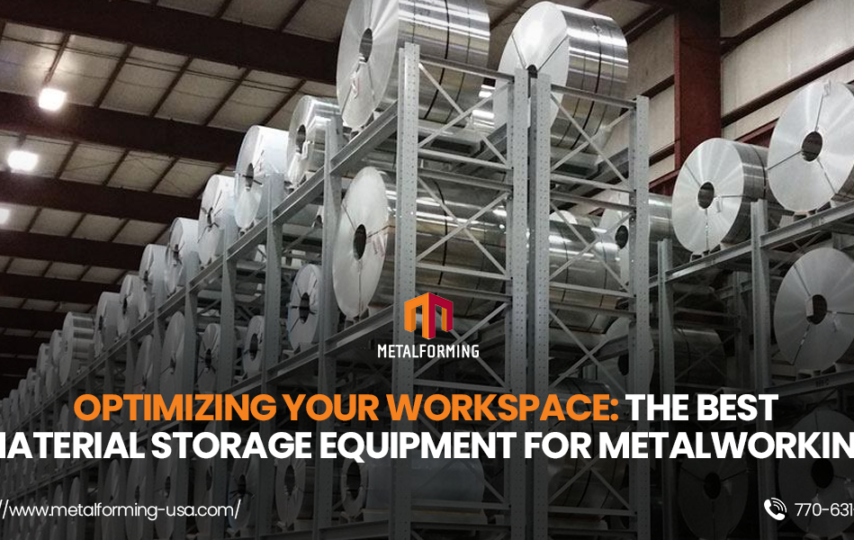In the world of metalworking, efficiency, safety, and productivity are key to maintaining a competitive edge. One often overlooked aspect that impacts all three of these critical areas is the proper storage of materials. The choice of material storage equipment is not just a matter of organization; it’s a strategic decision that affects every aspect of operations. In this comprehensive guide, we will delve into why proper material storage is important in metalworking, how to choose the right storage solutions for your shop, and explore innovative storage solutions that cater to the unique needs of metalworking materials.
Why is Proper Material Storage Important in Metalworking?
Material storage in metalworking goes beyond merely having a place to keep your metal sheets, rods, and other materials. It plays a pivotal role in ensuring workflow efficiency, enhancing safety, and optimizing space utilization. Properly stored materials are easier to locate, retrieve, and account for, reducing downtime and increasing productivity. Moreover, well-organized materials minimize the risk of accidents, such as tripping or falling objects, contributing to a safer work environment. Additionally, efficient storage solutions help maximize the use of available space, enabling workshops to accommodate more equipment or materials within the same area. Thus, investing in the right material storage equipment is not just about orderliness; it’s about enhancing the operational effectiveness and safety of your metalworking shop.
Choosing the Right Material Storage Equipment for Your Metalworking Shop
Selecting the best material storage equipment for your metalworking shop involves assessing your specific needs, considering the types of materials you work with, the available space, and your workflow processes. Here are key factors to consider:
- Material Characteristics: The nature of the materials you need to store — such as metal sheets, rods, or heavy coils — dictates the type of storage solution required. For example, vertical storage racks are ideal for sheet metal, whereas horizontal racks might better suit rod or bar storage.
- Space Availability: Evaluate the layout and space constraints of your workshop. Space-saving storage equipment, like vertical racks or overhead systems, can maximize floor space and improve workshop organization.
- Accessibility and Workflow: Consider how often materials need to be accessed and how they move through the workshop. Storage equipment should facilitate easy retrieval and transport of materials to workstations, aligning with your workflow for optimal efficiency.
- Safety and Ergonomics: Safety is paramount in metalworking. Choose storage solutions that minimize the need for manual lifting and reduce the risk of accidents. Solutions with ergonomic designs that comply with safety standards are essential.
- Modularity and Scalability: As your business grows, your storage needs will evolve. Opt for modular storage systems that can be easily expanded or reconfigured to accommodate future requirements.
- Cost Efficiency and Return on Investment (ROI): While initial cost is an important consideration, it’s equally crucial to evaluate the long-term value and ROI of your storage equipment. Cheaper options might save money upfront but could lead to higher expenses in the long run due to maintenance, replacement costs, or inefficiencies. Analyze the equipment’s potential to improve operations, save space, and enhance safety, and consider these benefits against the initial investment.
Innovative Storage Solutions for Metalworking Materials
The metalworking industry has seen significant advancements in storage technology, leading to a variety of innovative solutions designed to meet its unique demands. These include:
- Vertical Storage Systems: These systems are perfect for storage for metal sheets and plates, maximizing vertical space while minimizing the workshop’s footprint. They offer improved accessibility and can be automated for even greater efficiency.
- Mobile Racking Solutions: Mobile racks on casters provide flexibility, allowing materials to be moved easily around the shop as needed. This mobility aids in optimizing workshop layout and improving workflow.
- Automated Storage and Retrieval Systems (AS/RS): These systems offer unparalleled efficiency and accuracy in material handling and storage. They are ideal for high-volume metalworking shops, providing quick access to materials and reducing manual labor.
- Cantilever Racks: For long, bulky materials like metal rods or bars, cantilever racks offer an efficient storage solution. Their open design allows for easy access and can be customized to fit various lengths.
- Pallet Racking Systems: Versatile and sturdy, pallet racks are suitable for storing heavier materials and equipment. They utilize vertical space effectively and can be adapted with additional accessories for specific storage needs.
- Security Cages: For valuable or sensitive materials, secure storage is a necessity. Lockable metal cages ensure the safekeeping of such items, preventing unauthorized access.
- Hanging Systems: For smaller items or tools, hanging systems keep things organized and readily accessible. These can be mounted on walls or ceilings, saving valuable floor space.
Conclusion
Choosing the right and safe material storage equipment is crucial for the efficiency, safety, and productivity of metalworking shops. By considering the specific needs of your operations and exploring innovative storage solutions, you can optimize your workspace, streamline your workflow, and create a safer working environment. Remember, investing in high-quality material storage solutions is investing in the future success of your business.



